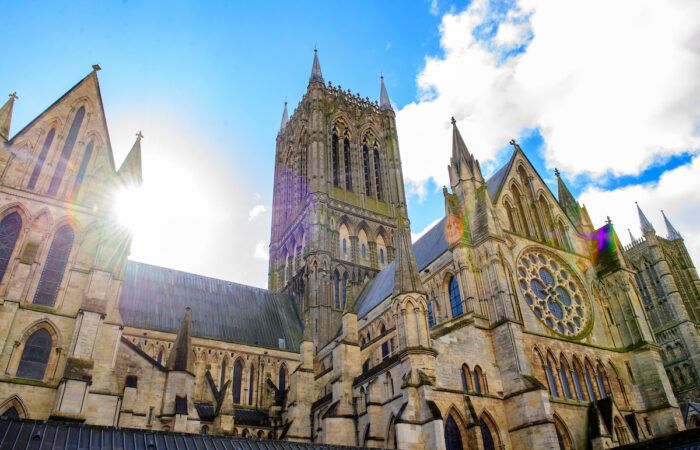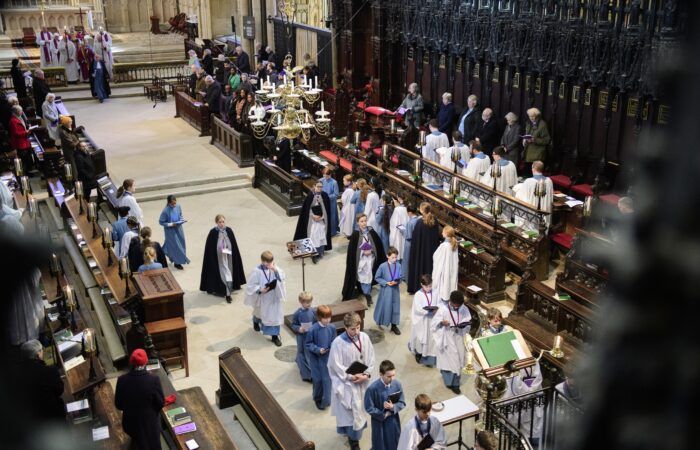Sermon given by The Reverend Dr Mark Hocknull, Chancellor on Sunday 25 September 2016
What on earth are the lectionary compliers doing to us, or what on earth is Luke doing to us? Last week we had a difficult and confusing parable for our gospel reading, and this week’s seems no less difficult. But if last week’s parable was difficult because it was rather confusing, this week’s parable is difficult because it seems painfully clear: hoard wealth in this life and suffer the consequences in the next. Or is it?
While there is absolutely no question that Luke was very concerned with the proper use of wealth. Both in his Gospel and in the Book of Acts the use of money is a major theme, and Luke offers many different examples of both good and poor use of wealth. But I’m not so sure he was trying to settle issues about the afterlife, let alone eternal punishment. This is a parable, after all, and in parables, metaphorical, exaggerated, language is the norm. So I hesitate to draw any hard and fast – let alone literal – conclusions from it. I don’t know whether you’ve noticed this, but there is actually very little talk in the New Testament about Hades or Hell anywhere but in parables. You can’t trust parables to give you an accurate picture of the afterlife. The language is designed to challenge and provoke you and make you think a little bit more about things, not give you a description of some reality or other.
In many ways Luke’s gospel is the most radical of all the New Testament writings. There is a constant theme of reversal of fortunes running through Luke’s writing. The Magnificat, the song of Mary contains the lines ‘He has put down the mighty from their thrones, and has exalted the humble and meek.’ Radical stuff! These words are sung virtually every day in the Cathedral. Usually they pass by almost unnoticed because they are set to beautiful music which is always so well performed by our choir. But this is dangerous stuff. The same theme of reversal of fortune is here in the gospel reading this morning. A rich man who has all the material comforts the world has to offer, but who never takes any notice of the poor beggar at his door dies and finds the afterlife far from congenial. Meanwhile Lazarus who suffered sorely on earth and was denied much finds he has everything.
Is this a stark warning? A threat that if the rich don’t mend their ways a terrible fate awaits them for all eternity? Or is it more like a thought experiment? An attempt to encourage empathy and seeing the world from another person’s perspective? I prefer this second interpretation. This is not a parable about the afterlife, but about our lives now.
Two things in particular persuade me to lean in this direction. First, the chasm that is fixed between the rich man and Lazarus isn’t, when you think about, new. That chasm was fixed a long, long time ago and reinforced every time the rich man came and went into his sumptuous home to feast at his rich table and ignored Lazarus. He obviously knew Lazarus was there and understood his plight, because he knows Lazarus by name. Yet he did nothing.
All of you will know the hymn All Things Bright and Beautiful. And some of you may remember the verse that has long been expunged from the hymn.
The rich man in his castle,
The poor man at his gate,
God made them high and lowly,
And ordered their estate
Typical 19th century theology. It’s all just part of the way of the world, the way God intended. There is nothing to be done about it.
The second, thing that makes me think the parable is about this life and not the afterlife is the rich man’s attitude to towards Lazarus. Even in the afterlife the rich man continues to treat Lazarus as a non-entity, a servant who should fetch him some water or, failing that, be sent as a messenger to his brothers. In both his earthly life and in the life to come, the rich man refuses to see Lazarus as a person, a human, a fellow child of God, and so ignores him and his plight.
Seeing is a very big thing for Luke. When the woman of possibly ill repute weeps at Jesus feet at Simon the Pharisee’s house Jesus asks Simon ‘do you see this woman?’ In other words have you noticed this woman and her plight; has it occurred to you that she is a fellow human being?
Before you can have compassion for people, you have to see them, acknowledging their presence, needs, and gifts and above all their status of children of God worthy of respect and dignity. This the rich man utterly fails to do. Which leads me to conclude that the chasm between them in this parabolic description of the afterlife is only a dramatization of the one that existed before, to the detriment of both, for no good comes from setting barriers between the children of God. And this may be Luke’s point all along, less warning us about punishment in the next life than urging us to the abundant life in this one that comes only in seeing those around us as God’s beloved children deserving our care, attention, and fellowship.
The climax of the parable is interesting. The rich man is told that his family have Moses and Prophets and if they will not listen to them, nothing will convince them of the mortal danger they are in. Who today are the people who have Moses and the Prophets, and also we could add the New Testament and the risen Christ. It is us, the people of God. The Church. The parable is not about the rich man at all. It is about us.
My good friend the Subdean talked about thin places on Friday evening in his welcome to the audience at the Halle concert. Thin places are places where the barrier between heaven and earth are thinner than we normally experience, where it is possible to catch a glimpse of heaven. He said that he believed and hoped that the Cathedral was such a thin place, where worshippers and visitors alike might be able to catch a glimpse of heaven. It is a belief and hope that I very much share.
Luke’s question to us is ‘does this make a difference to us?’
I don’t think Luke is saying that how we answer this question will determine our eternal destiny.
I think he is more interested in whether it shapes our life right now.
The gospel reading today isn’t about earning or relinquishing an eternal reward; it’s about the character and quality of our life right now. For Luke eternal life isn’t a distant reality at all. Eternal life starts now, each time we embrace the abundant life God offers in and through those around us. So while it is certainly a warning not to overlook those around us in need, it is also an invitation to live a fuller, more meaningful, and more joyous life by sharing ourselves – our time, talents, and certainly our wealth – with those around us here and now.

